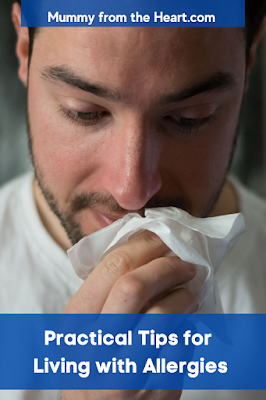{This is a paid collaboration with Klarify}
With over 44% of British adults now suffering from at least one allergy (1), it is high time that we all had better information, support and help for our allergies. As a child of the 70s and 80s, it was literally a couple of kids in my class who had asthma or suffered from food allergies or that was certainly how it seemed, but now so many of my children's classmates seem to have sensitivities, intolerances and allergies.
I do think it is good that we have much better information available to us nowadays and that product such as home allergy tests are so widely available. It is armed with good information that we're able to avoid the allergen triggers and help our homes remain a place of rest and respite.
If you're suffering from the classic allergy symptoms of red, itchy and watery eyes, running or blocked nose, sneezing, wheezing or cough, your first step needs to be identifying the source of your discomfort and this isn't always easy. Many allergies such as pet dander, pollen and house mite dust can produce the same or very similar symptoms and without diagnostic tests, you'll never know quite what to do. This can be very distressing if you have a beloved pet and you are unsure if they are the cause of your discomfort.
Talk to your GP initially and see if they are able to help, depending on the area and the severity of your symptoms they may offer testing such as skin prick or patch testing. If there is a long wait or they are not forthcoming you may choose to have an allergy blood test that you can perform yourself at home. This is a simple case of using a lancing device to prick your finger and 6 drops of blood need to be collected. Ths blood sample is then sent to the laboratory for analysis and within a few weeks, you'll have the online results that you can discuss with your GP and decide on an appropriate way forward to improve the comfort of your everyday life.
Here are a few tips, which are applicable to anyone you feels they have an allergy, either diagnosed or not -
Aim for a Healthy Lifestyle
It's an obvious one, but not everyone takes the advice on board. Getting enough sleep, minimising your stress levels, eating a well-balanced diet and exercising regularly can help to minimise allergy flare-ups. A 2014 study (2) demonstrated that individuals with persistent emotional stress have more frequent allergy flares and as such, it may be a good idea to engage in practices such as mindfulness, meditation or yoga.
Find what works for you
Some people swear by taking medications to help manage their allergies, antihistamines, decongestants or nasal sprays are all valid and useful, but others prefer to use home remedies. Simple things such as eating a spoon of local honey each day, using a saline spray, staying hydrated, applying a cold tea compress to your closed eyes and steam inhalation all work for some people.
Keep a Diary
This doesn't have to be anything complex, just jot down when you have symptoms and mark their severity, also make a note of where you've been or if you've done something unusual. After a while, this will give you a good picture to identify if you have seasonal allergies and then you can take actions to avoid the triggers. I moved house in 2013 and in Spring 2014 developed asthma, I now know it was the rapeseed fields that I walked through that triggered the start and every second year when they plant the rape every second year, I have to be careful to avoid being outdoors too much, especially when they are harvesting the field.
Track the Pollen Count
If your allergy is triggered by pollen, then it is worth keeping an eye on when it is highest and trying to avoid too much time outdoors then. Keep your windows and doors closed as much as possible and use an air filter if you have one. There are plenty of free apps that give the pollen count, such as NNC Weather and Klara.
Rapeseed pollen is often highest in the morning, whereas grass pollen is highest in the evening, so be aware of these factors and if you need to go out wear sunglasses and take an over-the-counter antihistamine to help with your symptoms.
Invest in Anti-allergy bedding
You'll want to keep dust mites at bay and bedding made specifically for this purpose is a great investment. Change your bedding frequently and tumble dry it to avoid any pollen from outdoors and this will help a lot. Oh yes and don't have any pets in your bedroom.
Your allergies don't have to ruin your everyday life, you just need to find the best way to manage them that suits your lifestyle. It may take some time but it will be a worthwhile process. Good Luck!
Why not pin this post for later?
Sources
(1) https://www.allergyuk.org/information-and-advice/statistics
(2) https://www.annallergy.org/article/S1081-1206(13)00492-4/abstract











